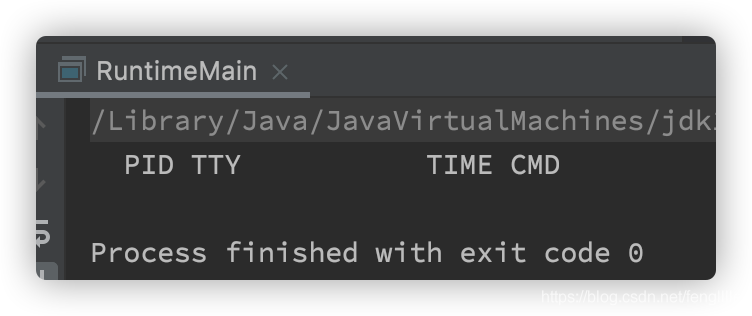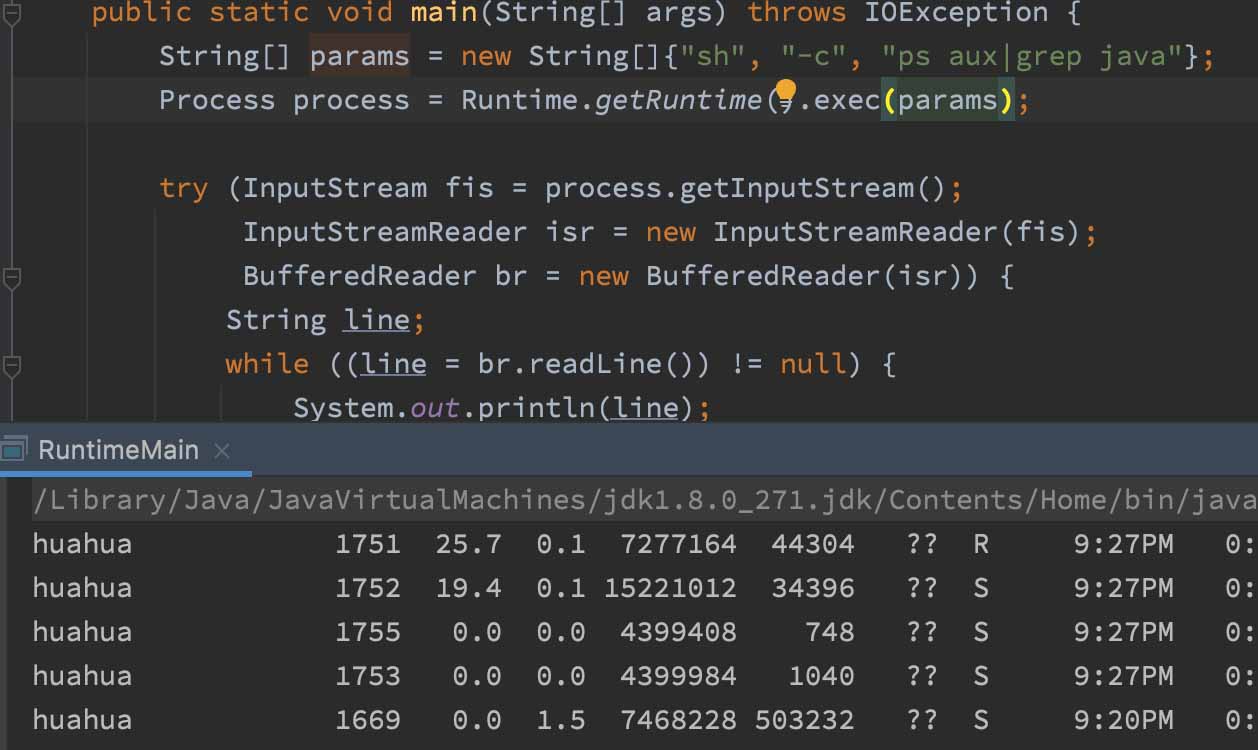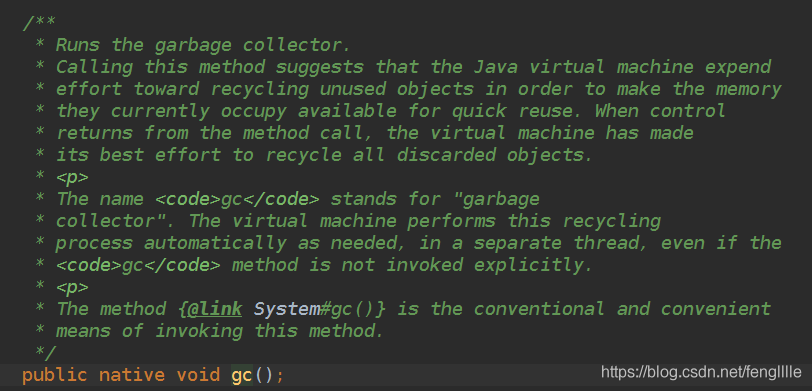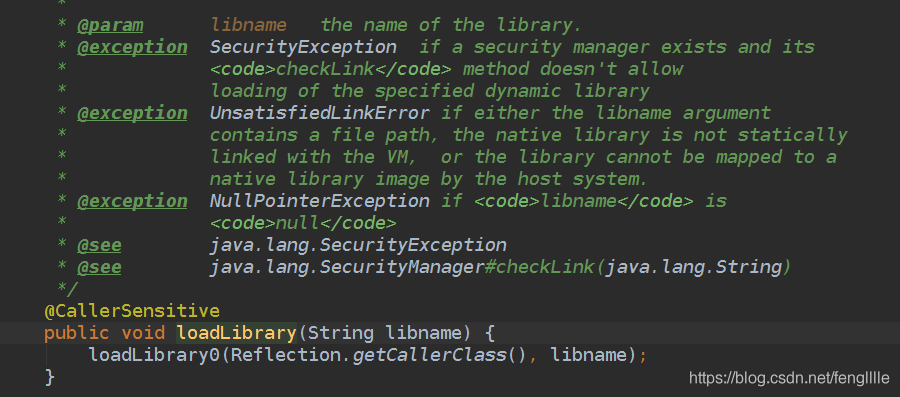Java Runtime的使用方法是什么
这篇文章将为大家详细讲解有关Java Runtime的使用方法是什么,文章内容质量较高,因此小编分享给大家做个参考,希望大家阅读完这篇文章后对相关知识有一定的了解。
前言
最近做项目框架,需要在框架结束的时候,关闭服务器连接,清除部分框架运行lock文件,这里就想到了shutdownhook,顺便学了学Runtime的使用
1. shutdownhook
demo示例,证明在程序正常结束的时候会调用,如果kill -9 那肯定就不会调用了
public class ShutdownHookTest {
public static void main(String[] args) {
System.out.println("==============application start================");
Runtime.getRuntime().addShutdownHook(new Thread(()->{
System.out.println("--------------hook 1----------------");
}));
Runtime.getRuntime().addShutdownHook(new Thread(()->{
System.out.println("--------------hook 2----------------");
}));
System.out.println("==============application end================");
}
}
正常运行结束,结果如下
==============application start================
==============application end================
--------------hook 1----------------
--------------hook 2----------------
Process finished with exit code 0
如果暂停,点击下图左下角的正方形红图标,停止正在运行的应用

结果如下,shutdownhook已执行。

shutdownhook可以处理程序正常结束的时候,删除文件,关闭连接等
2. exec执行
2.1 常规命令执行
demo示例如下,比如ls
public class ShutdownHookTest {
public static void main(String[] args) throws InterruptedException, IOException {
Process process = Runtime.getRuntime().exec("ls");
try (InputStream fis = process.getInputStream();
InputStreamReader isr = new InputStreamReader(fis);
BufferedReader br = new BufferedReader(isr)) {
String line;
while ((line = br.readLine()) != null) {
System.out.println(line);
}
}
}
}
结果如下

而正常执行结果

但是这个方法有远程执行风险,即在浏览器端通过这个方法执行特定指令,比如执行rm -rf *,结果就很……
2.2 管道符
但是遇见管道符之后就会失效,什么办法解决,sh -c,但是不能直接用,否则获取到的是TTY窗口信息
public static void main(String[] args) throws IOException {
Process process = Runtime.getRuntime().exec("sh -c ps aux|grep java");
try (InputStream fis = process.getInputStream();
InputStreamReader isr = new InputStreamReader(fis);
BufferedReader br = new BufferedReader(isr)) {
String line;
while ((line = br.readLine()) != null) {
System.out.println(line);
}
}
}
结果????

sh -c的参数要分离,不然runtime会认为是一个参数

2.3源码分析
跟踪代码,使用ProcessImpl来执行指令
public Process exec(String[] cmdarray, String[] envp, File dir)
throws IOException {
return new ProcessBuilder(cmdarray)
.environment(envp)
.directory(dir)
.start();
}
ProcessBuilder
// Only for use by ProcessBuilder.start()
static Process start(String[] cmdarray,
java.util.Map<String,String> environment,
String dir,
ProcessBuilder.Redirect[] redirects,
boolean redirectErrorStream)
throws IOException
{
assert cmdarray != null && cmdarray.length > 0;
// Convert arguments to a contiguous block; it's easier to do
// memory management in Java than in C.
byte[][] args = new byte[cmdarray.length-1][];
int size = args.length; // For added NUL bytes
for (int i = 0; i < args.length; i++) {
args[i] = cmdarray[i+1].getBytes();
size += args[i].length;
}
byte[] argBlock = new byte[size];
int i = 0;
for (byte[] arg : args) {
System.arraycopy(arg, 0, argBlock, i, arg.length);
i += arg.length + 1;
// No need to write NUL bytes explicitly
}
int[] envc = new int[1];
byte[] envBlock = ProcessEnvironment.toEnvironmentBlock(environment, envc);
int[] std_fds;
FileInputStream f0 = null;
FileOutputStream f1 = null;
FileOutputStream f2 = null;
try {
if (redirects == null) {
std_fds = new int[] { -1, -1, -1 };
} else {
std_fds = new int[3];
if (redirects[0] == Redirect.PIPE)
std_fds[0] = -1;
else if (redirects[0] == Redirect.INHERIT)
std_fds[0] = 0;
else {
f0 = new FileInputStream(redirects[0].file());
std_fds[0] = fdAccess.get(f0.getFD());
}
if (redirects[1] == Redirect.PIPE)
std_fds[1] = -1;
else if (redirects[1] == Redirect.INHERIT)
std_fds[1] = 1;
else {
f1 = new FileOutputStream(redirects[1].file(),
redirects[1].append());
std_fds[1] = fdAccess.get(f1.getFD());
}
if (redirects[2] == Redirect.PIPE)
std_fds[2] = -1;
else if (redirects[2] == Redirect.INHERIT)
std_fds[2] = 2;
else {
f2 = new FileOutputStream(redirects[2].file(),
redirects[2].append());
std_fds[2] = fdAccess.get(f2.getFD());
}
}
return new UNIXProcess
(toCString(cmdarray[0]),
argBlock, args.length,
envBlock, envc[0],
toCString(dir),
std_fds,
redirectErrorStream);
} finally {
// In theory, close() can throw IOException
// (although it is rather unlikely to happen here)
try { if (f0 != null) f0.close(); }
finally {
try { if (f1 != null) f1.close(); }
finally { if (f2 != null) f2.close(); }
}
}
}
new UNIXProcess 环境
/**
* java.lang.Process subclass in the UNIX environment.
*
* @author Mario Wolczko and Ross Knippel.
* @author Konstantin Kladko (ported to Linux and Bsd)
* @author Martin Buchholz
* @author Volker Simonis (ported to AIX)
*/
final class UNIXProcess extends Process {
3. 总结
Runtime用处非常多,偏底层
比如gc调用

加载jar文件

Runtime功能强大,但需要合理利用,很多攻击是通过Runtime执行的漏洞
但是使用shutdownhook还是很方便的,用来做停止任务的后续处理。
关于Java Runtime的使用方法是什么就分享到这里了,希望以上内容可以对大家有一定的帮助,可以学到更多知识。如果觉得文章不错,可以把它分享出去让更多的人看到。
免责声明:本站发布的内容(图片、视频和文字)以原创、转载和分享为主,文章观点不代表本网站立场,如果涉及侵权请联系站长邮箱:niceseo99@gmail.com进行举报,并提供相关证据,一经查实,将立刻删除涉嫌侵权内容。













评论